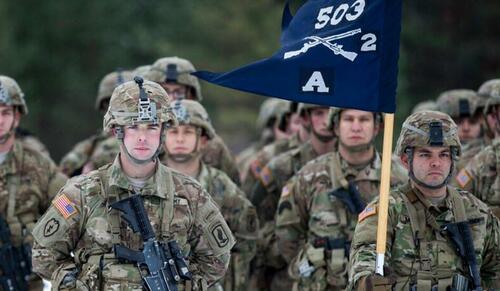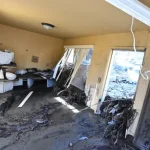
Authored by Thomas Brooke via Remix News,
A recent war simulation reported by the German newspaper Bild has modeled the potential fallout from a Russian attack on NATO’s eastern flank, specifically targeting the Baltic states.
The simulation, which explores the implications of such a conflict, highlights a worst-case scenario where NATO’s response could be delayed, leaving Lithuania and its neighbors vulnerable to a Russian advance.
The computer-simulated wargame, developed with input from former U.S. Army Europe commander Ben Hodges and former NATO Supreme Allied Commander Philip Breedlove, envisions an attack taking place in 2027, with Russian forces launching assaults from Belarus and the Kaliningrad region, swiftly moving to occupy parts of Lithuania, Latvia, and Estonia.
The focus of the attack would be the strategically significant Suwałki Corridor, a 100-kilometer stretch of land connecting Kaliningrad to Belarus.
Often dubbed “the most dangerous place on the planet,” this corridor could be used to cut off the Baltic states from the rest of NATO.
The simulation suggests that NATO’s Article 5 – the alliance’s collective defense clause – could take several days to activate, causing delays in mobilizing support.
As a result, Lithuania and the other Baltic states would need to face Russian forces alone for up to 10 days before NATO could deliver significant reinforcements to the region.
During this period, NATO’s German brigade stationed in Lithuania, expected to number 5,000 troops and 44 Leopard 2 tanks by 2027, would play a crucial role.
In the simulation, German tanks eventually halted the Russian advance within three days of deployment.
“We need to buy as much time as possible,” explained General Breedlove.
“First there will be air support, then the fleet, and then heavy ground troops. It would be necessary to hold positions until the arrival of large NATO forces,” he noted.
Despite successful resistance, the damage to Lithuania would be severe, with the country left partially occupied and devastated by the end of the conflict.
Thousands of fatalities on both sides would also be recorded in a ferocious few days of fighting.
Authored by Thomas Brooke via Remix News,
A recent war simulation reported by the German newspaper Bild has modeled the potential fallout from a Russian attack on NATO’s eastern flank, specifically targeting the Baltic states.
The simulation, which explores the implications of such a conflict, highlights a worst-case scenario where NATO’s response could be delayed, leaving Lithuania and its neighbors vulnerable to a Russian advance.
The computer-simulated wargame, developed with input from former U.S. Army Europe commander Ben Hodges and former NATO Supreme Allied Commander Philip Breedlove, envisions an attack taking place in 2027, with Russian forces launching assaults from Belarus and the Kaliningrad region, swiftly moving to occupy parts of Lithuania, Latvia, and Estonia.
The focus of the attack would be the strategically significant Suwałki Corridor, a 100-kilometer stretch of land connecting Kaliningrad to Belarus.
Often dubbed “the most dangerous place on the planet,” this corridor could be used to cut off the Baltic states from the rest of NATO.
The simulation suggests that NATO’s Article 5 – the alliance’s collective defense clause – could take several days to activate, causing delays in mobilizing support.
As a result, Lithuania and the other Baltic states would need to face Russian forces alone for up to 10 days before NATO could deliver significant reinforcements to the region.
During this period, NATO’s German brigade stationed in Lithuania, expected to number 5,000 troops and 44 Leopard 2 tanks by 2027, would play a crucial role.
In the simulation, German tanks eventually halted the Russian advance within three days of deployment.
“We need to buy as much time as possible,” explained General Breedlove.
“First there will be air support, then the fleet, and then heavy ground troops. It would be necessary to hold positions until the arrival of large NATO forces,” he noted.
Despite successful resistance, the damage to Lithuania would be severe, with the country left partially occupied and devastated by the end of the conflict.
Thousands of fatalities on both sides would also be recorded in a ferocious few days of fighting.
Loading…





